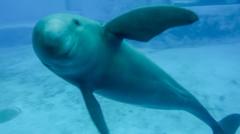John Hume, previously the owner of the world's largest rhino farm, stands accused of leading an international smuggling syndicate involving the illegal export of rhino horns to Southeast Asia, a practice he vehemently denies.
**South African Conservationist John Hume Proclaims Innocence in $14 Million Rhino Horn Smuggling Case**

**South African Conservationist John Hume Proclaims Innocence in $14 Million Rhino Horn Smuggling Case**
A leading figure in wildlife conservation, John Hume, faces serious charges of smuggling rhino horns but maintains his innocence in a case that has garnered international attention.
In a turbulent development in the conservation community, John Hume, an esteemed conservationist in South Africa, has been charged with involvement in an alleged trafficking operation worth $14 million (£10 million) relating to rhino horns. The accusations surfaced during a court appearance in Pretoria, where Hume, along with five accomplices, faced 55 charges, including theft and money laundering. The prosecution suggests that the group falsified export permits to facilitate the illegal transport of over 960 rhino horns from South Africa to Southeast Asia, where the horns are traditionally used in medicine.
While the domestic sale of rhino horns is legal in South Africa, exporting them is strictly banned, a crucial detail that underlines the gravity of the charges. Hume, aged 83, known for establishing Platinum Rhino, the world's largest rhino farm, has vehemently denied any wrongdoing. "I have nothing to hide," was Hume's declaration in a public statement where he expressed his commitment to cooperating with authorities and maintaining his innocence. He expects that the legal process will eventually clear his name.
The former farm, home to around 2,000 southern white rhinos, was sold by Hume in 2023 due to unsustainable operational costs. Hume's background, marked by a transition from developing holiday resorts to his current conservation role, underscores his longstanding commitment to wildlife preservation, raising questions about the motivations behind the accusations against him.
As the legal proceedings unfold, the conservation community and global audiences are left to ponder the implications of this case, particularly concerning the balance between conservation efforts and the ongoing battle against wildlife trafficking.
While the domestic sale of rhino horns is legal in South Africa, exporting them is strictly banned, a crucial detail that underlines the gravity of the charges. Hume, aged 83, known for establishing Platinum Rhino, the world's largest rhino farm, has vehemently denied any wrongdoing. "I have nothing to hide," was Hume's declaration in a public statement where he expressed his commitment to cooperating with authorities and maintaining his innocence. He expects that the legal process will eventually clear his name.
The former farm, home to around 2,000 southern white rhinos, was sold by Hume in 2023 due to unsustainable operational costs. Hume's background, marked by a transition from developing holiday resorts to his current conservation role, underscores his longstanding commitment to wildlife preservation, raising questions about the motivations behind the accusations against him.
As the legal proceedings unfold, the conservation community and global audiences are left to ponder the implications of this case, particularly concerning the balance between conservation efforts and the ongoing battle against wildlife trafficking.




















